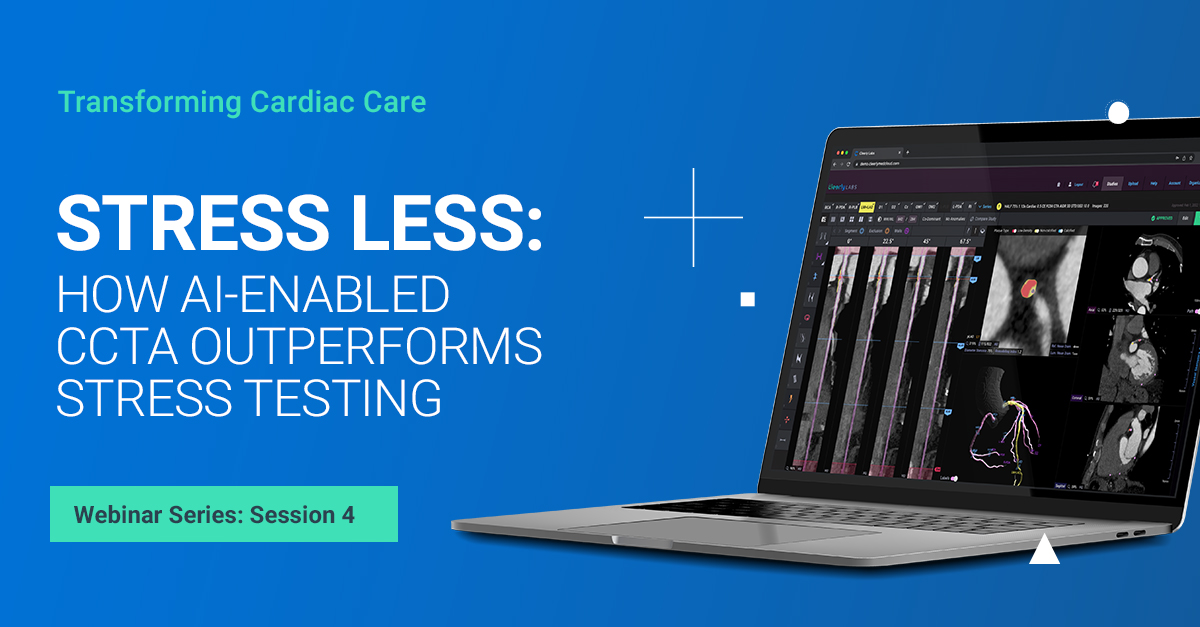The Recipe to a Healthy Heart:Your Guide to Preventing Heart Disease
Sure, the taste of food is important, but do you know how your diet impacts your heart? Many foods contain hidden ingredients that negatively impact...
3 min read
 James K. Min, MD, FACC, FESC, MSCCT, Founder & CEO of Cleerly
:
September 19, 2022
James K. Min, MD, FACC, FESC, MSCCT, Founder & CEO of Cleerly
:
September 19, 2022

Myocardial perfusion, also known as a "stress test", is today's go-to-method for detecting coronary artery disease - despite limited performance.
To address challenges with the status quo, Cleerly hosted a "Stress Less: How AI-enabled CCTA Outperforms Stress Testing for Heart Disease Detection" webinar where we shared new evidence showing that AI-enabled CCTA is a better option for detecting coronary artery disease (CAD). Cleerly founder and CEO, D. James K. Min, CMO Dr. James P. Earls and Dr. Andrew Choi, Associate Professor of Medicine and Radiology at George Washington University, discussed why stress tests are so pervasive, despite inaccuracy - leading to unnecessary invasive coronary angiography (ICA) for many patients.
The stress test is one of the most commonly used tools to determine someone's heart attack risk, with more than 8 million ordered annually in the United States. Unfortunately, a stress test can only determine through indirect measures whether an artery is more than 70% blocked, and it cannot detect whether a plaque will rupture, lead to the formation of blood clots, and occlude an artery. In fact, 90% of stress tests come back with normal results. A stress test may give both providers and patients a false sense of security when in fact, they have advanced atherosclerosis.
Cleerly's model of personalized cardiovascular care leverages our AI-enabled analysis of coronary computed tomography angiography (CCTA) images to identify, characterize, and quantify plaque buildup. This model is better than the stress test alone in terms of both sensitivity (95% vs. 74%) and specificity (63% vs. 43%) for detecting stenosis greater than 50%.
To date, there has only been one large-scale, randomized control trial that has shown how non-invasive CCTA can save lives. The SCOT HEART trial showed a 41% reduction in deaths and non-fatal heart attacks at a five-year endpoint. Patients in the experimental arm underwent CCTA in addition to a standard of care testing; because the CCTA was able to depict atherosclerosis in many patients where the stress test was read as “normal”, those patients were prescribed and adhered to primary prevention (medication) at a significantly higher rate. There was no difference between the control group and the CCTA group in the number of angiograms, stents, or bypass surgeries. Detection and treatment of non-obstructive atherosclerosis saves lives.
Cleerly is picking up where SCOT-HEART left off. Through multiple studies, Cleerly has shown extraordinary ability to detect and classify atherosclerosis. Cleerly uncovers high-risk arterial plaque in 58% more patients as compared to expert human readers, reduces referrals for invasive coronary angiography by up to 87%, and affirm the value of Cleerly’s AI-enabled CCTA approach over invasive methods for heart disease evaluation.
Cleerly's new care pathway for cardiovascular care gives healthcare a closed-loop, step-by-step approach for early diagnosis, informed decision-making, and personalized treatment and tracking of coronary heart disease. Clinicians are no longer forced to rely on indirect disease markers and inaccurate diagnostic tools as they speculate on patients’ heart disease risk and make “best-guess” care plan recommendations.
Cleerly and its founders have spent more than a decade researching the effectiveness of coronary computed tomography angiography (CCTA) and advanced analytics compared to other methods of measuring atherosclerosis. This body of extensive clinical evidence will enable Cleerly to develop a personalized care pathway for heart attack prevention. The intention of the care pathway is to identify more at-risk patients sooner and support a closed-loop healthcare journey for those patients – all with the goal of preventing heart attacks from happening in the first place.
Cleerly identifies patients at a high risk of coronary artery disease (CAD) sooner than the traditional stress test. This improves clinical outcomes, as it allows physicians to pursue a course of treatment based on lifestyle interventions or therapeutics. It also reduces utilization of invasive angiography by 39% (when used alone) to 49% (when used in combination with stress testing). As nearly two-thirds of invasive angiographies are shown to be unnecessary, this can lead to substantial downstream cost savings.
Cleerly's goal for cardiovascular care is to empower physicians with the insights to prevent heart attacks for hundreds of thousands in the United States and around the world. Through the adoption of the Cleerly personalized care pathway for heart attack prevention, healthcare will no longer be overlooking the more than 50% of patients who will suffer heart attack or death without any prior symptoms or the 90% of patients who undergo an unnecessary stress test.
Access our Transforming Cardiovascular Care page to hear from experts and peers about this critical shift in developing a new standard of heart care.
Access Cleerly vs. Stress Testing Webinar
WATCH NOW
References:

Sure, the taste of food is important, but do you know how your diet impacts your heart? Many foods contain hidden ingredients that negatively impact...

As we reach the end of 2023 and yet another remarkable year at Cleerly, it’s a great opportunity to reflect on all we’ve accomplished and begin...

Cleerly has had a busy few months – attending conferences, panel sessions, and winning awards as we all work together to achieve our mission of a...

Last week, our team at Cleerly had the opportunity to take part in a gathering of impassioned cardiac computed tomography (CT) leaders at the Society...

Half of patients who have a heart attack don't show symptoms prior to their event. A new standard of precision care that emphasizes comprehensive...

Half of patients who have a heart attack don't show symptoms prior to their event. A new standard of precision care, emphasizing comprehensive...